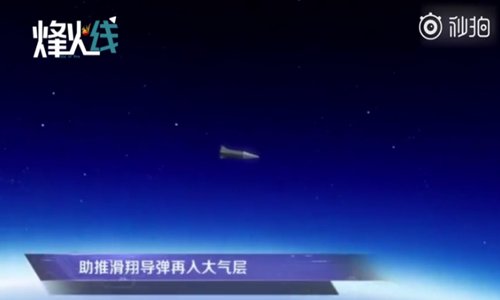
An animated video released by the China Aerospace Science and Industry Corporation shows a boost-glide vehicle reentering the atmosphere. Photo: Screenshot from Passion News
China's missile manufacturing giant showcased hypersonic boost-glide vehicles in a recent animated video, and media reports speculate that the weapon might be the DF-17 of the People's Liberation Army (PLA) Rocket Force.
Such weapons, which Russia and the US are developing, are very difficult to intercept due to their hypersonic speed and high mobility, experts said Monday.
The animated video, released by the state-owned China Aerospace Science and Industry Corporation (CASIC) on its social media platform Douyin account, shows the launch of multiple boost-glide vehicles, which reenter the atmosphere and hit an underground command center.
This is the first time the company has shown a simulated animation on a boost-glide vehicle, Passion News, a media outlet under k618.cn, a news portal run by the Communist Youth League of China Central Committee, reported on Sunday.
A boost-glide vehicle, which is essentially a warhead, is stored in the nose of a missile, and will be released once the rocket booster sends it fast and high enough. It will then fly over the upper edge of the atmosphere, changing directions frequently, which makes it very difficult to intercept by anti-missile systems, Wei Dongxu, a Beijing-based military analyst, told the Global Times on Monday.
Such a glide vehicle flies at hypersonic speeds, so the enemy has little time to react, Wei noted.
Russia's Avangard and the US' AGM-183A missiles also use similar technologies.
Citing analysts, Passion News said the weapon in the CASIC video could be the DF-17 of the People's Liberation Army (PLA) Rocket Force, as reports said the DF-17 missile uses a hypersonic boost-glide vehicle as its warhead.
The Chinese military has not yet announced any hypersonic glide vehicle deployment.

